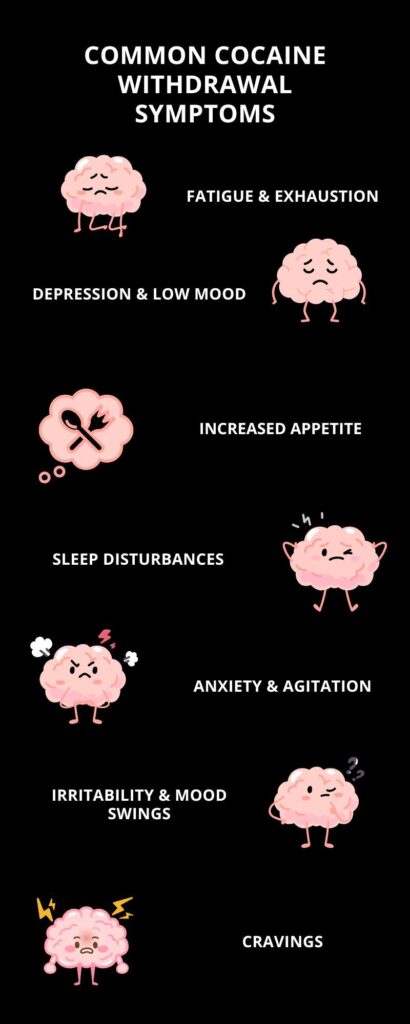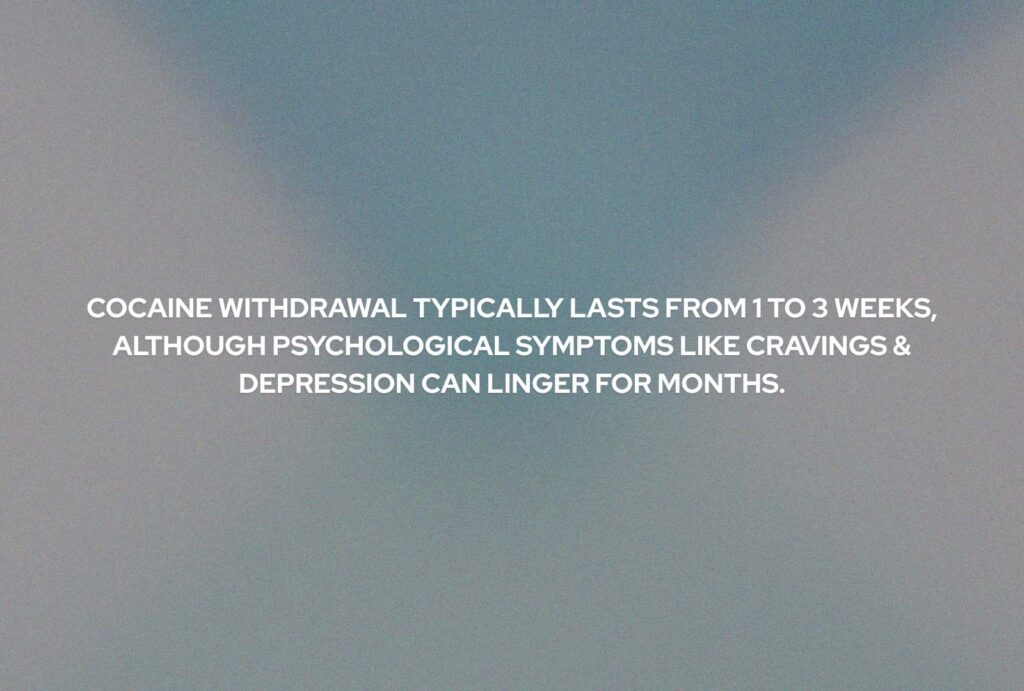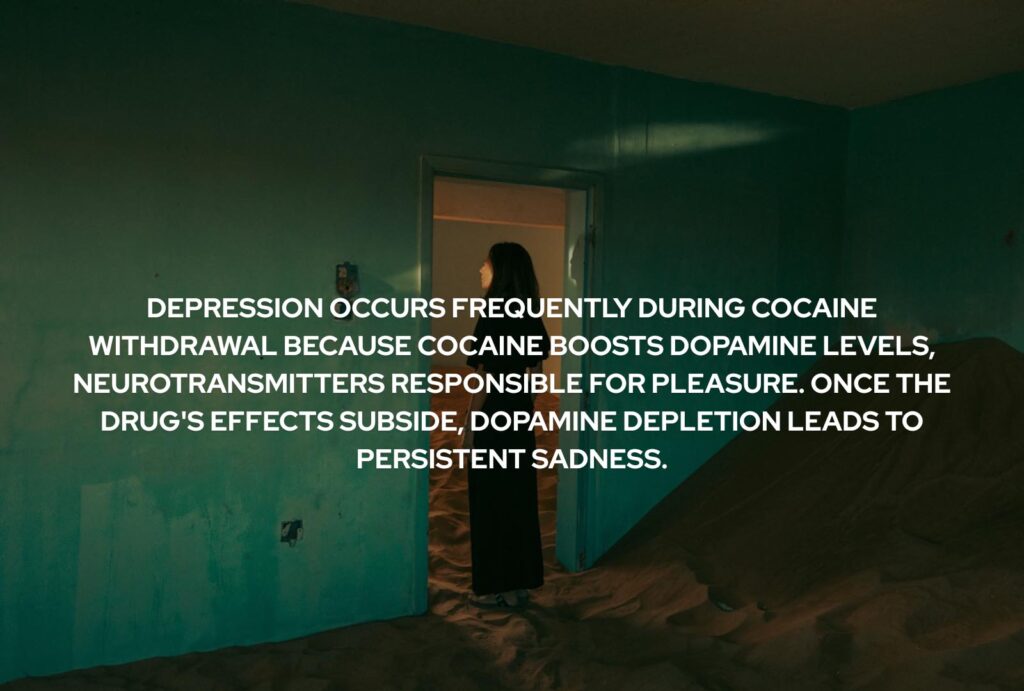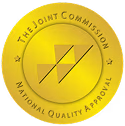Cocaine withdrawal symptoms include fatigue, depression, anxiety, irritability, and intense cravings. These symptoms occur when someone who regularly uses cocaine suddenly reduces or stops their drug intake. The severity and duration of withdrawal symptoms vary based on the individual's usage history, dosage, and personal health factors.
Understanding cocaine withdrawal symptoms helps individuals and healthcare providers create effective recovery strategies.
Common Cocaine Withdrawal Symptoms

Cocaine withdrawal manifests in several physical and psychological symptoms. Here are the most frequently observed symptoms during withdrawal:
1. Fatigue and Exhaustion
Fatigue is among the earliest cocaine withdrawal symptoms. Cocaine stimulates the central nervous system, causing increased energy. When usage stops, extreme exhaustion sets in, often lasting several days.
2. Depression and Low Mood
Depression occurs frequently during cocaine withdrawal because cocaine boosts dopamine levels—neurotransmitters responsible for pleasure. Once the drug's effects subside, dopamine depletion leads to persistent sadness, lack of motivation, and feelings of hopelessness.
3. Increased Appetite
Withdrawal from cocaine typically causes increased appetite. Cocaine suppresses appetite, so stopping its use often leads to intense hunger, resulting in rapid weight gain during the recovery phase.
4. Sleep Disturbances
Sleep issues such as insomnia or hypersomnia (excessive sleeping) commonly accompany cocaine withdrawal. Insomnia occurs because the brain struggles to restore a balanced sleep cycle after prolonged stimulant use.
5. Anxiety and Agitation
Anxiety levels significantly rise when stopping cocaine. Cocaine affects brain chemistry, and withdrawal disrupts normal neurological functioning, causing agitation, restlessness, and panic attacks.
6. Irritability and Mood Swings
Mood instability and irritability are hallmark psychological cocaine withdrawal symptoms. Users often feel frustrated or angered easily during withdrawal as their nervous system attempts to stabilize.
7. Cocaine Cravings
Powerful cravings for cocaine occur during withdrawal. The brain develops dependence, creating intense physical and psychological urges for the drug that often lead to relapse without proper support.
How Long Does Cocaine Withdrawal Last?
Cocaine withdrawal typically lasts from 1 to 3 weeks, although psychological symptoms like cravings and depression can linger for months. The withdrawal process generally follows this timeline:
- Initial Crash (1–3 Days): Intense fatigue, irritability, anxiety, and depression immediately after stopping cocaine.
- Withdrawal Phase (1–2 Weeks): Cravings peak, alongside persistent depression, fatigue, sleep problems, and anxiety.
- Extinction Phase (Weeks to Months): Gradual reduction in symptoms, but lingering cravings and intermittent mood issues persist.

Factors Affecting Cocaine Withdrawal Severity
Several factors influence cocaine withdrawal severity, including:
- Duration and Frequency of Use: Long-term, heavy cocaine use typically causes more severe withdrawal symptoms.
- Dosage: Higher doses significantly intensify withdrawal experiences.
- Co-occurring Mental Health Issues: Individuals with mental health conditions like depression or anxiety may experience heightened withdrawal symptoms.
- Physical Health: Poor physical health exacerbates symptoms, making withdrawal more difficult.
Managing Cocaine Withdrawal Symptoms
Effective management strategies significantly improve withdrawal outcomes and reduce relapse risks. Essential techniques include:
1. Medical Detox
Medically supervised detoxification provides medications and monitoring to manage withdrawal symptoms safely, reducing severe discomfort and medical complications.
2. Counseling and Psychotherapy
Counseling helps individuals cope with emotional symptoms such as anxiety, depression, and cravings. Therapy methods like cognitive-behavioral therapy (CBT) teach healthier coping mechanisms.
3. Support Groups
Participation in support groups like Narcotics Anonymous (NA) helps maintain sobriety by offering community support and practical advice during recovery.
4. Healthy Lifestyle Choices
Maintaining proper nutrition, regular exercise, hydration, and sufficient sleep supports physical recovery, stabilizes mood, and reduces withdrawal symptom intensity.
Potential Complications During Cocaine Withdrawal
Although typically not life-threatening, cocaine withdrawal carries potential complications:
- Severe Depression: May lead to suicidal thoughts or actions without proper intervention.
- Relapse: High relapse risk exists due to intense cocaine cravings.
- Physical Health Issues: Rapid weight changes, nutritional deficiencies, or exhaustion can affect overall health.
Immediate professional support significantly reduces these risks.

When to Seek Medical Help for Cocaine Withdrawal?
Seek medical assistance immediately if experiencing severe depression, suicidal thoughts, uncontrollable anxiety, or overwhelming cravings during cocaine withdrawal. Professional intervention greatly improves the chances of successful recovery.
For comprehensive information on managing withdrawal symptoms and treatment options, refer to resources like the our inpatient cocaine addiction treatment program.
Recognizing cocaine withdrawal symptoms early, along with professional support, greatly enhances recovery prospects.





.png)
